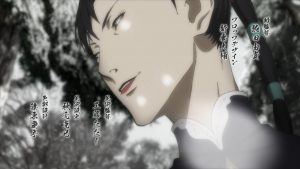 In the final analysis, there are two things that stand out about Mugen no Juunin: Immortal for me. First, it was ultimately disappointing – notable for what it might have been as much as for what it was. But the second is that at its best it was truly beautiful. I don’t use that word too often about anime, especially those themed like Immortal, but it fits. The gap between this show at its best and at its worst is about as wide as any current series that’s not Gegege no Kitarou. And those two truths must be reconciled in any attempt to summarize the series as a whole.
In the final analysis, there are two things that stand out about Mugen no Juunin: Immortal for me. First, it was ultimately disappointing – notable for what it might have been as much as for what it was. But the second is that at its best it was truly beautiful. I don’t use that word too often about anime, especially those themed like Immortal, but it fits. The gap between this show at its best and at its worst is about as wide as any current series that’s not Gegege no Kitarou. And those two truths must be reconciled in any attempt to summarize the series as a whole.
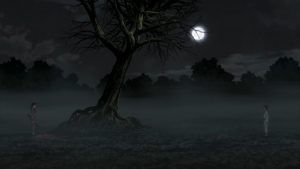 As someone who hasn’t read Samura Hiroaki’s manga, I can’t assess how much of what’s disappointing and beautiful comes from it, and how much from Hamasaki Hiroshi’s adaptation. To an extent of course the beauty is easier, because Hamasaki’s genius is on display so often throughout these 24 episodes (not least the final one). It’s easy to look at Eizouken and see that pretty much everything worthwhile about it comes from the execution of the anime – without Science Saru’s brilliance there’s just no “there” there. With Immortal it’s much harder to see the line.
As someone who hasn’t read Samura Hiroaki’s manga, I can’t assess how much of what’s disappointing and beautiful comes from it, and how much from Hamasaki Hiroshi’s adaptation. To an extent of course the beauty is easier, because Hamasaki’s genius is on display so often throughout these 24 episodes (not least the final one). It’s easy to look at Eizouken and see that pretty much everything worthwhile about it comes from the execution of the anime – without Science Saru’s brilliance there’s just no “there” there. With Immortal it’s much harder to see the line.
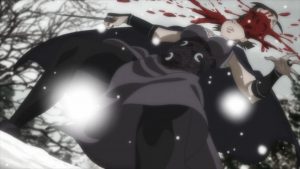 In particular, what I can’t say without knowing the source material is whether the muddled nature of the story is mostly down to cramming 30 volumes into 24 episodes. Obviously that’s a factor, but I get the sense that some of the problem is Samura’s writing. I can’t help but compare this story to Rurouni Kenshin, which incorporates not one but two extended story arcs with broadly similar themes and executes them with far more clarity and elegance. This ending was muddy, a mess – too many characters, too much death for individual deaths to matter, and finally uncertain about what the whole point of it all was.
In particular, what I can’t say without knowing the source material is whether the muddled nature of the story is mostly down to cramming 30 volumes into 24 episodes. Obviously that’s a factor, but I get the sense that some of the problem is Samura’s writing. I can’t help but compare this story to Rurouni Kenshin, which incorporates not one but two extended story arcs with broadly similar themes and executes them with far more clarity and elegance. This ending was muddy, a mess – too many characters, too much death for individual deaths to matter, and finally uncertain about what the whole point of it all was.
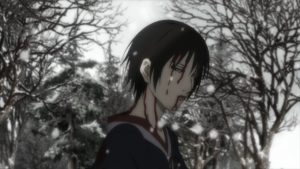 I’m sure if we’d gotten to know the supporting characters better (as I’m assuming happens in the manga) they wouldn’t have blended together so much here. But with everything that happens in the Kyoto Arc (or Jinchuu, for that matter) we know why. We feel every character’s stake in those events, and good or evil every death feels like a part of us being ripped away. And when Kenshin, Kaoru and Yahiko finally head back to Edo, we understood what it all meant. What did all this mean? What was the point?
I’m sure if we’d gotten to know the supporting characters better (as I’m assuming happens in the manga) they wouldn’t have blended together so much here. But with everything that happens in the Kyoto Arc (or Jinchuu, for that matter) we know why. We feel every character’s stake in those events, and good or evil every death feels like a part of us being ripped away. And when Kenshin, Kaoru and Yahiko finally head back to Edo, we understood what it all meant. What did all this mean? What was the point?
 I think the most obvious question hanging over Immortal’s denouement was whether Samura made the right call in having Rin kill Kagehisa. She didn’t best him in combat – she killed a seriously injured man in a cowardly sneak attack. That whole sop about wanting the chain of curses to end, and going on a trip to apologize to the families struck me as pretty hollow, like Samura was trying to have it both ways. The impression I get is that he himself didn’t know what he wanted to say with the ending, so he abdicated responsibility and left it up to the reader to decide.
I think the most obvious question hanging over Immortal’s denouement was whether Samura made the right call in having Rin kill Kagehisa. She didn’t best him in combat – she killed a seriously injured man in a cowardly sneak attack. That whole sop about wanting the chain of curses to end, and going on a trip to apologize to the families struck me as pretty hollow, like Samura was trying to have it both ways. The impression I get is that he himself didn’t know what he wanted to say with the ending, so he abdicated responsibility and left it up to the reader to decide.
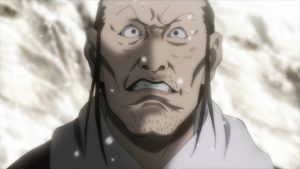 At least as big a problem for me is that Manji became irrelevant in his own story. If Rin’s arc is going to be the true spine of the narrative, at least have it all amount to something significant. Manji doesn’t even have the benefit of a muddled conclusion – his arc has no conclusion because in truth, he has no arc. His past doesn’t matter, his punishment doesn’t matter, his aspirations don’t matter. Manji is an accessory, a plot device. And again, the way he story concludes – pairing him off with Rin’s great-great(-great?) granddaughter (and Kagehisa’s arm) – strikes me as a copout. After not even giving the audience a farewell between he and Rin, to boot.
At least as big a problem for me is that Manji became irrelevant in his own story. If Rin’s arc is going to be the true spine of the narrative, at least have it all amount to something significant. Manji doesn’t even have the benefit of a muddled conclusion – his arc has no conclusion because in truth, he has no arc. His past doesn’t matter, his punishment doesn’t matter, his aspirations don’t matter. Manji is an accessory, a plot device. And again, the way he story concludes – pairing him off with Rin’s great-great(-great?) granddaughter (and Kagehisa’s arm) – strikes me as a copout. After not even giving the audience a farewell between he and Rin, to boot.
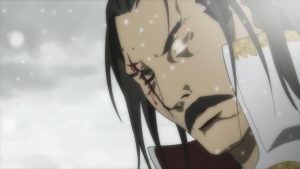 Indeed, the only part of the conclusion that really worked for me was Renzo’s, because all along it seemed to me that Rin should have sent him off to apprentice with Souri in the first place. And Renzo hardly counts as a major character. But for all that, this was still a stunning final episode in so many respects – and that just makes it more frustrating. Even if the events were kind of meaningless Hamasaki depicted them with stunning grace and style – for example, giving us the climactic (largely anti-, narratively speaking) battle mostly without dialogue. Genius like his can’t be hidden – it bursts through even when the material itself doesn’t have the ability to meet it halfway.
Indeed, the only part of the conclusion that really worked for me was Renzo’s, because all along it seemed to me that Rin should have sent him off to apprentice with Souri in the first place. And Renzo hardly counts as a major character. But for all that, this was still a stunning final episode in so many respects – and that just makes it more frustrating. Even if the events were kind of meaningless Hamasaki depicted them with stunning grace and style – for example, giving us the climactic (largely anti-, narratively speaking) battle mostly without dialogue. Genius like his can’t be hidden – it bursts through even when the material itself doesn’t have the ability to meet it halfway.
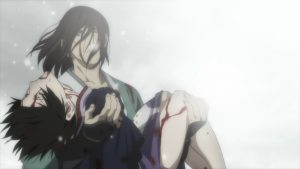 I’d love to see what this adaptation would have looked like at something like the Kyoto Arc’s pace (11 volumes in 35 episodes) but of course we’ll never know. I’m heartily glad Immortal existed, because as anime grows ever-safer and more generic the opportunity to see an auteur like Hamasaki work is one that should be cherished all the more for its rarity. He took what probably should by rights have been a disaster and made it significant, and at its best even memorable. And the scope of that achievement is something that shouldn’t be underestimated.
I’d love to see what this adaptation would have looked like at something like the Kyoto Arc’s pace (11 volumes in 35 episodes) but of course we’ll never know. I’m heartily glad Immortal existed, because as anime grows ever-safer and more generic the opportunity to see an auteur like Hamasaki work is one that should be cherished all the more for its rarity. He took what probably should by rights have been a disaster and made it significant, and at its best even memorable. And the scope of that achievement is something that shouldn’t be underestimated.


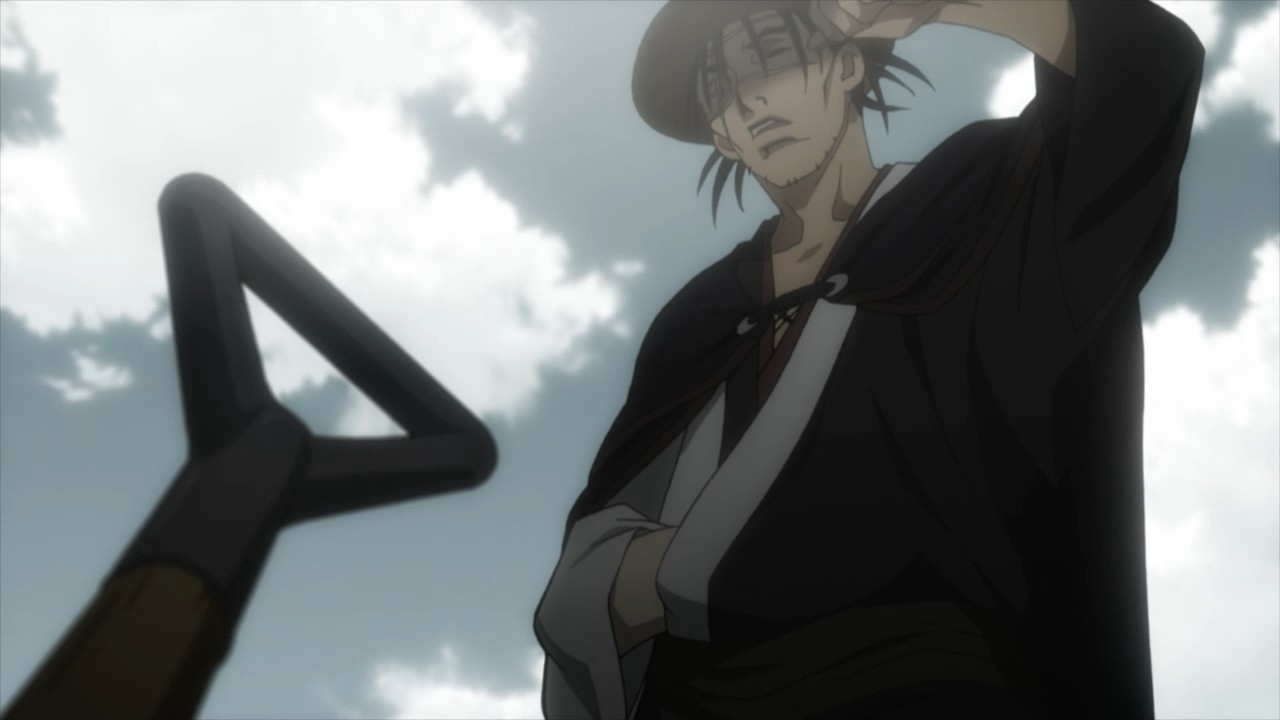
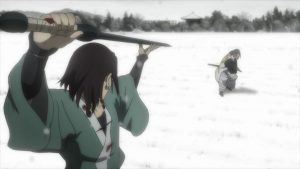
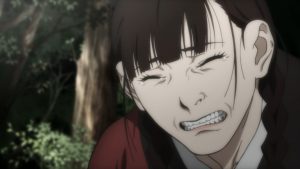
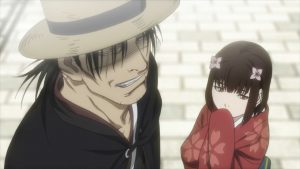
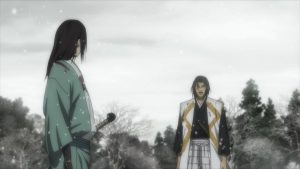

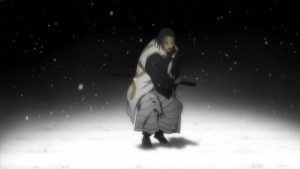

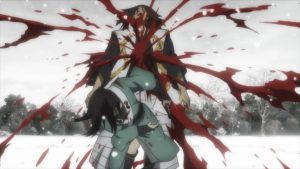
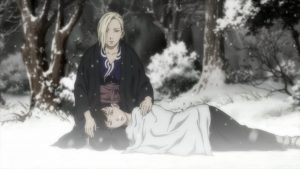
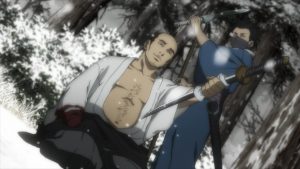
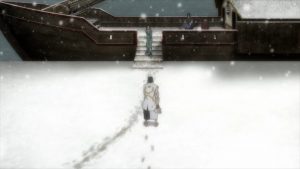
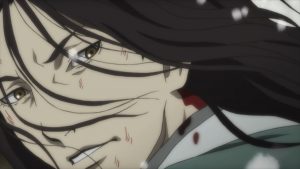
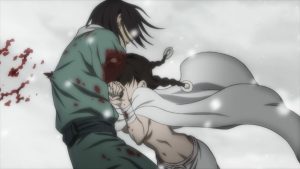
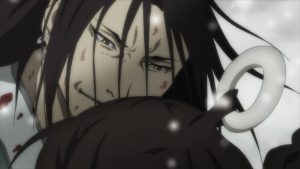



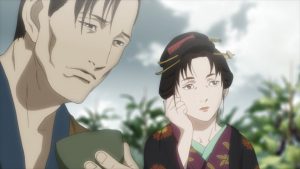

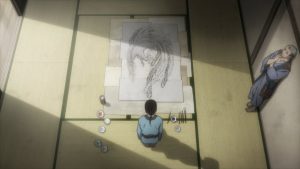
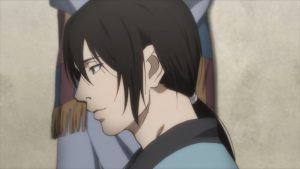
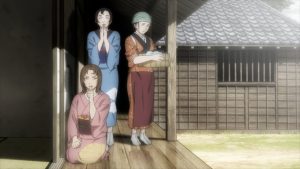
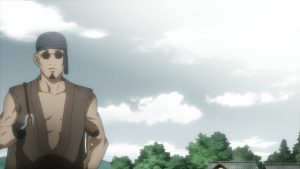
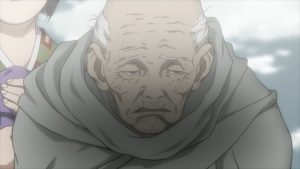
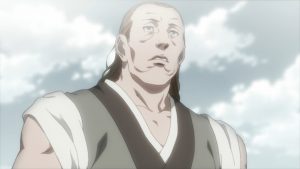
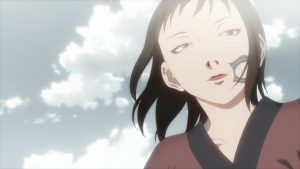
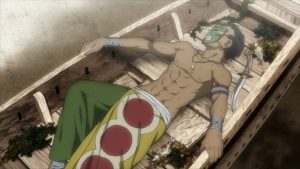
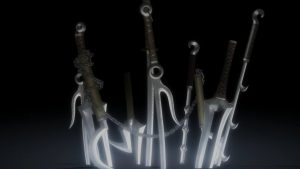
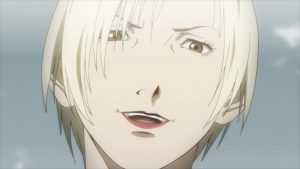
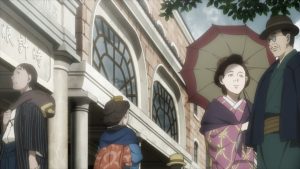
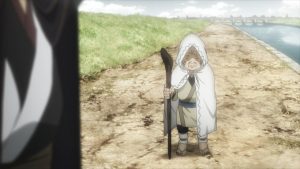
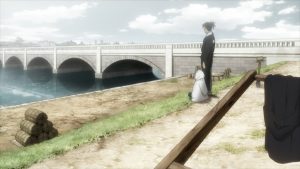
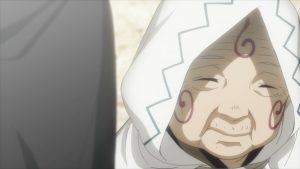
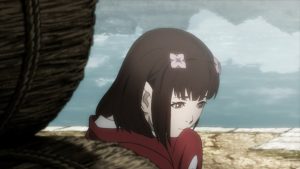
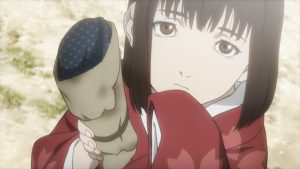
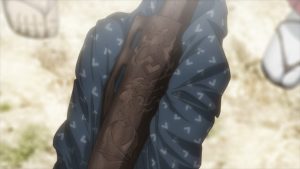

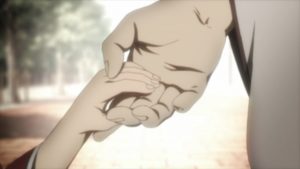
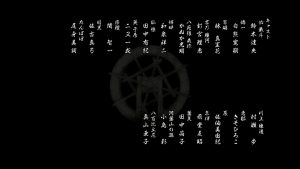


Deluxe
March 27, 2020 at 5:39 amWe could have had a great show if half the cast was removed and the narrative focused on the core characters. This story had many things going on but very few of it felt like it actually mattered in the end. As you said it is probably because of Samura’s undisciplined writiing rather than this adaptation which tried its best with very limited means.
Overall I liked the anime. This is the kind of gritty, hyper-violent samurai stuff that anime was known back in the glorious era of 90s OAVs. It is certainly less well-produced than Dororo, but it was also less ponderous and melodramatic which is why I enjoyed it more.
Red
March 27, 2020 at 9:08 amI didn’t concern myself much with the writing knowing this was supposed to be a full adaptation of the manga with just 24 episodes. As such this show can be very messy and senseless at most with the occasional touch of beauty here and there from director Hamasaki, the difficulty of which cannot be understated. I like the samurai seinen genre though the violence in this adaptation can be excessive at times, in general, I think this a fine adaptation.
Hey Enzo, have you watched Hamasaki’s other samurai series Shigurui or read the manga vagabond? If so, what are your thoughts if you compare it with this blade of the immortal series?
Guardian Enzo
March 27, 2020 at 12:37 pmI adore Vagabond, and I’d rank it well above Immortal though to be fair that’s a high bar – Vagabond would be in my top 5 manga ever. It kills me that it’s never been adapted (though I get it) and even more that Inoue may never finish it.
Red
March 27, 2020 at 2:28 pmGlad to hear it, it’s one of my top manga series too. Well if you’re up to reading, you can grab Yoshikawa Eiji’s novel Musashi to finish the story since that is where Vagabond is based off I think. I’m still trying to find time to read it though as it’s a novel after all without skipping towards the end.
Color2413
March 27, 2020 at 4:06 pmI have to give my highest recommendation to the musical score of episode 24, which over-achieved in every way and made the first part (without dialog) so vivid in its depiction of mood. Lots of people died. I couldn’t keep track of them all. And yet…
What I was left with at the end was a depiction of a huge, unsettling loneliness. When you are immortal, every human connection you have ever known eventually dims and fades away. The era changes unrecognizable (and we, the audience, knows what is yet to come). Yet Manji endures. Could he have survived the nuclear blasts and firestorms of WWII that destroyed whole cities? And what would he think of modern-day Tokyo, with its neon streets and bytes flowing through its digital veins?
Guardian Enzo
March 27, 2020 at 4:41 pmThe wheel keeps turning…
Panino Manino
March 28, 2020 at 4:23 am“she killed a seriously injured man in a cowardly sneak attack”
Not really true. If you rewatch the scene you can see that he let her strike him, with a smile on his face.
They agreed with this at the end of the first half, that she would decide when she would kill him.
The problem with this adaptation was that they didn’t adapt enough.
I’ll say this till the end of times, they should had cut Shira from the second half, at least half of what they kept.
They left out too many little details, too many small scenes, a few essential chapters.
With the last episode Hamasaki showed that he knew the action scenes weren’t all that essential for this story, so it’s very strange to see that in some episodes he proves he can focus on the essential why in other he doesn’t.
Terabox video downloader
May 12, 2024 at 7:45 pmI completely agree with your assessment of the series. The ending was quite impactful and fitting for the characters. Madoka’s backstory was particularly interesting and added depth to her character. I also felt that the fight scenes were well choreographed and the animation was top-notch. Overall, I’m glad I got to explore this unique series with your review!